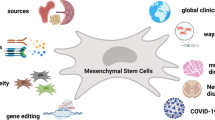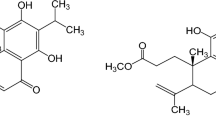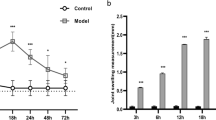Abstract
Adipose tissue–derived mesenchymal stem cells (ADSC) exert neuroprotective and anti-inflammatory effects. ADSCs are considered potential therapeutics for rheumatoid arthritis (RA), an inflammatory, multisystemic autoimmune disease. Epigallocatechin-3-gallate (EGCG), the major polyphenolic compound in green tea, has strong anti-inflammatory and antioxidant properties. This study aimed to investigate whether EGCG has a synergistic effect on the neuroprotective effects of ADSCs to protect the RA-damaged brain. Wistar rats were classified into four groups: sham, RA, RA + ADSCs (1 × 106 cells per rat), and RA + EGCG (10 µM)-pretreated ADSCs. After 2 months of treatment, the brain tissues from the rats were collected and investigated. The brains of RA rats had higher inflammation and apoptosis. ADSC treatment ameliorated these negative effects significantly; however, the neuroprotective abilities of EGCG-pretreated ADSCs were significantly higher than ADSCs. Furthermore, the RA-induced repression of the PI3K/Akt survival pathway was reactivated by EGCG-pretreated ADSCs. Collectively, this study provides evidence that EGCG synergistically enhances the neuroprotective ability of ADSCs to repress the negative effects of RA on the brain. These findings could help develop new therapeutic strategies against RA or other neurodegenerative diseases after clinical validation in the future.









Similar content being viewed by others
Data Availability
The raw data used and/or analyzed during the current study are available from the corresponding author on reasonable request. The authors confirm that the data supporting the findings of this study are available within the article.
Abbreviations
- ADSC:
-
Adipose tissue-derived mesenchymal stem cell
- EGCG:
-
Epigallocatechin-3-gallate
- MSC:
-
Mesenchymal stem cell
- RA:
-
Rheumatoid arthritis
References
Ahmed S (2010) Green tea polyphenol epigallocatechin 3-gallate in arthritis: progress and promise. Arthritis Res Ther 12(2):1–9
Ansboro S, Roelofs AJ, De Bari C (2017) Mesenchymal stem cells for the management of rheumatoid arthritis: immune modulation, repair or both? Curr Opin Rheumatol 29(2):201–207
Barik P, Shibu MA, Hsieh DJY, Day CH, Chen RJ, Kuo WW, Chang YM, Padma VV, Ho TJ, Huang CY (2021) Cardioprotective effects of transplanted adipose-derived stem cells under Ang II stress with Danggui administration augments cardiac function through upregulation of insulin-like growth factor 1 receptor in late-stage hypertension rats. Environ Toxicol 36(7):1466–1475
Berg J, Roch M, Altschüler J, Winter C, Schwerk A, Kurtz A, Steiner B (2015) Human adipose-derived mesenchymal stem cells improve motor functions and are neuroprotective in the 6-hydroxydopamine-rat model for Parkinson’s disease when cultured in monolayer cultures but suppress hippocampal neurogenesis and hippocampal memory function when cultured in spheroids. Stem Cell Reviews and Reports 11(1):133–149
Chang WS, Tsai CW, Yang JS, Hsu YM, Shih LC, Chiu HY, Bau DT, Tsai FJ (2021) Resveratrol inhibited the metastatic behaviors of cisplatin‐resistant human oral cancer cells via phosphorylation of ERK/p‐38 and suppression of MMP‐2/9. J Food Biochem:e13666
Chen T-S, Liou S-Y, Kuo C-H, Pan L-F, Yeh Y-L, Liou J, Padma VV, Yao C-H, Kuo W-W, Huang C-Y (2017) Green tea epigallocatechin gallate enhances cardiac function restoration through survival signaling expression in diabetes mellitus rats with autologous adipose tissue-derived stem cells. J Appl Physiol 123(5):1081–1091
Chen T-S, Liou S-Y, Lin H-H, Hung M-Y, Lin C-C, Lin Y-M, Lin K-H, Padma VV, Yao C-H, Kuo W-W (2021) Oral administration of green tea Epigallocatechin-3-gallate reduces oxidative stress and enhances restoration of cardiac function in diabetic rats receiving autologous transplantation of adipose-derived stem cells. Arch Physiol Biochem 127(1):82–89
D’Anca M, Fenoglio C, Serpente M, Arosio B, Cesari M, Scarpini EA, Galimberti D (2019) Exosome determinants of physiological aging and age-related neurodegenerative diseases. Frontiers in Aging Neuroscience 11:232
Gutiérrez-Fernández M, Otero-Ortega L, Ramos-Cejudo J, Rodríguez-Frutos B, Fuentes B, Díez-Tejedor E (2015) Adipose tissue-derived mesenchymal stem cells as a strategy to improve recovery after stroke. Expert Opin Biol Ther 15(6):873–881. https://doi.org/10.1517/14712598.2015.1040386
Ho T-J, Tsai BC-K, Kuo C-H, Luk H-N, Day CH, Hsieh DJ-Y, Chen R-J, Yao C-H, Kumar VB, Kuo W-W (2022) Arecoline induces cardiotoxicity by upregulating and activating cardiac hypertrophy-related pathways in Sprague–Dawley rats. Chemico-biological interactions:109810
Hsieh DJ, Marte L, Kuo WW, Ju DT, Chen WS, Kuo CH, Day CH, Mahalakshmi B, Liao PH, Huang CY (2020) Epigallocatechin-3-gallate preconditioned adipose-derived stem cells confer neuroprotection in aging rat brain. Int J Med Sci 17(13):1916–1926. https://doi.org/10.7150/ijms.46696
Huang TY, Peng SF, Huang YP, Tsai CH, Tsai FJ, Huang CY, Tang CH, Yang JS, Hsu YM, Yin MC (2020) Combinational treatment of all-trans retinoic acid (ATRA) and bisdemethoxycurcumin (BDMC)-induced apoptosis in liver cancer Hep3B cells. J Food Biochem 44(2):e13122
Jo CH, Lee YG, Shin WH, Kim H, Chai JW, Jeong EC, Kim JE, Shim H, Shin JS, Shin IS (2014) Intra-articular injection of mesenchymal stem cells for the treatment of osteoarthritis of the knee: a proof-of-concept clinical trial. Stem Cells 32(5):1254–1266
Joaquim AF, Appenzeller S (2015) Neuropsychiatric manifestations in rheumatoid arthritis. Autoimmun Rev 14(12):1116–1122
Ju D-T, Tsai BC-K, Sitorus MA, Kuo W-W, Kuo C-H, Chen T-S, Hsieh DJ-Y, Ho T-J, Huang C-Y, Wang C-H (2022) Curcumin-pretreated adipose-derived stem cells enhance the neuroprotective ability to repair rheumatoid arthritis-induced damage in the rat brain. Am J Chinese Med 1–16
Kannan K, Ortmann RA, Kimpel D (2005) Animal models of rheumatoid arthritis and their relevance to human disease. Pathophysiology 12(3):167–181
Kappy NS, Chang S, Harris WM, Plastini M, Ortiz T, Zhang P, Hazelton JP, Carpenter JP, Brown SA (2018) Human adipose-derived stem cell treatment modulates cellular protection in both in vitro and in vivo traumatic brain injury models. J Trauma Acute Care Surg 84(5):745–751
Kim J-W, Suh C-H (2020) Systemic manifestations and complications in patients with rheumatoid arthritis. In. Multidisciplinary Digital Publishing Institute, p 2008
Lin J-Y, Ho T-J, Tsai BC-K, Chiang C-Y, Kao H-C, Kuo W-W, Chen R-J, Viswanadha VP, Huang C-W, Huang C-Y (2021a) Exercise renovates H2S and Nrf2-related antioxidant pathways to suppress apoptosis in the natural ageing process of male rat cortex. Biogerontology 22(5):495–506
Lin WY, Tsai BCK, Day CH, Chiu PL, Chen RJ, Chen MYC, Padma VV, Luk HN, Lee HC, Huang CY (2021b) Arecoline induces heart injure via Fas/Fas ligand apoptotic pathway in heart of Sprague–Dawley rat. Environmental Toxicology
Liu S-P, Shibu MA, Tsai F-J, Hsu Y-M, Tsai C-H, Chung J-G, Yang J-S, Tang C-H, Wang S, Li Q, Huang C-Y (2020) Tetramethylpyrazine reverses high-glucose induced hypoxic effects by negatively regulating HIF-1α induced BNIP3 expression to ameliorate H9c2 cardiomyoblast apoptosis. Nutr Metab 17(1):1–9. https://doi.org/10.1186/s12986-020-0432-x
Lopez-Santalla M, Fernandez-Perez R, Garin MI (2020) Mesenchymal stem/stromal cells for rheumatoid arthritis treatment: an update on clinical applications. Cells 9(8):1852
Ma T, Gong K, Ao Q, Yan Y, Song B, Huang H, Zhang X, Gong Y (2013) Intracerebral transplantation of adipose-derived mesenchymal stem cells alternatively activates microglia and ameliorates neuropathological deficits in Alzheimer’s disease mice. Cell transplantation 22(1_suppl):113–126
Mancini E, Beglinger C, Drewe J, Zanchi D, Lang UE, Borgwardt S (2017) Green tea effects on cognition, mood and human brain function: a systematic review. Phytomedicine 34:26–37
Morinobu A, Biao W, Tanaka S, Horiuchi M, Jun L, Tsuji G, Sakai Y, Kurosaka M, Kumagai S (2008) (−)-Epigallocatechin-3-gallate suppresses osteoclast differentiation and ameliorates experimental arthritis in mice. Arthritis & Rheumatism: Official Journal of the American College of Rheumatology 58(7):2012–2018
Nagle DG, Ferreira D, Zhou Y-D (2006) Epigallocatechin-3-gallate (EGCG): chemical and biomedical perspectives. Phytochemistry 67(17):1849–1855
Pittenger MF, Discher DE, Péault BM, Phinney DG, Hare JM, Caplan AI (2019) Mesenchymal stem cell perspective: cell biology to clinical progress. NPJ Regenerative Medicine 4(1):1–15
Ra JC, Kang SK, Shin IS, Park HG, Joo SA, Kim JG, Kang B-C, Lee YS, Nakama K, Piao M (2011) Stem cell treatment for patients with autoimmune disease by systemic infusion of culture-expanded autologous adipose tissue derived mesenchymal stem cells. J Transl Med 9(1):1–11
Rudan I, Sidhu S, Papana A, Meng SJ, Xin-Wei Y, Wang W, Campbell-Page RM, Demaio AR, Nair H, Sridhar D, Theodoratou E, Dowman B, Adeloye D, Majeed A, Car J, Campbell H, Wang W, Chan KY (2015) Prevalence of rheumatoid arthritis in low- and middle-income countries: a systematic review and analysis. J Glob Health 5(1):010409. https://doi.org/10.7189/jogh.05.010409
Smolen JS, Aletaha D (2015) Rheumatoid arthritis therapy reappraisal: strategies, opportunities and challenges. Nat Rev Rheumatol 11(5):276–289. https://doi.org/10.1038/nrrheum.2015.8
Süß P, Rothe T, Hoffmann A, Schlachetzki JC, Winkler J (2020) The Joint-brain axis: insights from rheumatoid arthritis on the crosstalk between chronic peripheral inflammation and the brain. Frontiers in Immunology 11
Tomita K, Madura T, Mantovani C, Terenghi G (2012) Differentiated adipose-derived stem cells promote myelination and enhance functional recovery in a rat model of chronic denervation. J Neurosci Res 90(7):1392–1402
Tsai BC-K, Kuo W-W, Day CH, Hsieh DJ-Y, Kuo C-H, Daddam J, Chen R-J, Padma VV, Wang G, Huang C-Y (2020) The soybean bioactive peptide VHVV alleviates hypertension-induced renal damage in hypertensive rats via the SIRT1-PGC1α/Nrf2 pathway. J Funct Foods 75:104255
Tsuji W, Rubin JP, Marra KG (2014) Adipose-derived stem cells: implications in tissue regeneration. World Journal of Stem Cells 6(3):312
Uccelli A, de Rosbo NK (2015) The immunomodulatory function of mesenchymal stem cells: mode of action and pathways. Ann N Y Acad Sci 1351(1):114–126
Ueyama H, Okano T, Orita K, Mamoto K, Sobajima S, Iwaguro H, Nakamura H (2020) Local transplantation of adipose-derived stem cells has a significant therapeutic effect in a mouse model of rheumatoid arthritis. Sci Rep 10(1):1–11
Yeh Y-L, Lu M-C, Tsai BC-K, Tzang B-S, Cheng S-M, Zhang X, Yang L-Y, Mahalakshmi B, Kuo W-W, Xiang P (2021) Heat-killed Lactobacillus reuteri GMNL-263 inhibits systemic lupus erythematosus–induced cardiomyopathy in NZB/W F1 mice. Probiotics and Antimicrobial Proteins 13:51–59
Acknowledgements
This study was supported by Tri-Service General Hospital (TSGH-D-109098 and TSGH-D-110073) and Ministry of Science and Technology (106-2320-B-303-004-MY3).
Author information
Authors and Affiliations
Contributions
Ming-Shan Chen, Tung-Sheng Chen, and Chih-Yang Huang conceptualized and designed the study. Bruce Chi-Kang Tsai and Maria Angelina Sitorus collected and assembled the data. Tung-Sheng Chen provided materials for the study. Bruce Chi-Kang Tsai, Maria Angelina Sitorus, and Chia-Hua Kuo analyzed and interpreted the data. Ming-Shan Chen and Bruce Chi-Kang Tsai wrote the draft of the manuscript. Tsung-Jung Ho and Chih-Yang Huang reviewed and gave the final approval of the manuscript. Wei-Wen Kuo, Tsung-Jung Ho, Chih-Yang Huang, and Da-Tong Ju provided the administrative support. Chien-Yao Fu, Chih-Yang Huang, and Da-Tong Ju provided financial support. All authors reviewed the manuscript.
Corresponding authors
Ethics declarations
Ethics Approval and Consent to Participate
All experimental protocols were approved by the Institutional Animal Care and Use Committee of China Medical University, Taichung, Taiwan.
Consent for Publication
The authors agree the publication.
Conflict of Interest
The authors declare that there are no conflicts of interest.
Additional information
Publisher's Note
Springer Nature remains neutral with regard to jurisdictional claims in published maps and institutional affiliations.
Highlights
• RA releases chronic inflammatory factors cause abnormal brain function.
• EGCG-pretreated ADSC attenuates inflammation in the RA-injured rat brain.
• EGCG-pretreated ADSC alleviates RA-induced apoptosis of brain in a RA rat model.
• EGCG-pretreated ADSC enhances PI3K/Akt survival mechanism in RA-damaged brain.
• EGCG-pretreated ADSC can be new therapy to relieve brain discomfort in RA patients.
Rights and permissions
About this article
Cite this article
Chen, MS., Tsai, B.CK., Sitorus, M.A. et al. Epigallocatechin-3-Gallate Pretreatment Improves Autologous Adipose-derived Stem Cells Against Rheumatoid Arthritis-induced Neuroinflammation in the Brain of Collagen-induced Rats. Neurotox Res 40, 1223–1234 (2022). https://doi.org/10.1007/s12640-022-00544-0
Received:
Revised:
Accepted:
Published:
Issue Date:
DOI: https://doi.org/10.1007/s12640-022-00544-0




